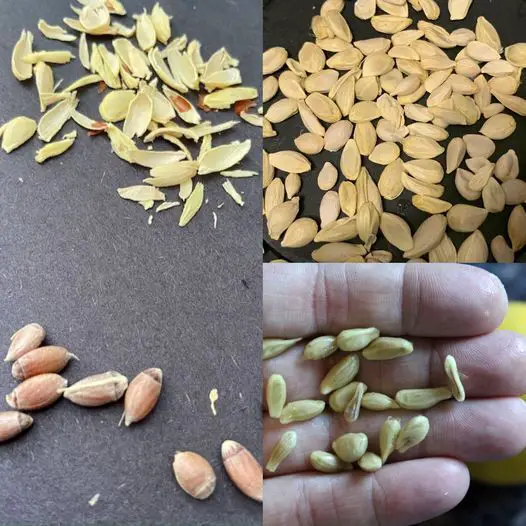Exploring the Hidden Benefits of Lemon Seeds
When it comes to juicing lemons, most people tend to discard the tiny seeds without a second thought. However, these little seeds can be surprisingly valuable when utilized properly. Instead of tossing them away, let’s explore the numerous ways lemon seeds can be beneficial to you, from growing your own lemon tree to crafting delightful fragrances for your home.
The Versatile Lemon: A Nutritional Powerhouse
Lemons are celebrated for their vibrant flavor and versatility in the culinary world. Not only do they add zest to a variety of dishes, but they are also packed with vitamin C, an essential nutrient for immune function and skin health. The natural acidity of lemons aids digestion and can provide relief from bloating.
Originating from Asia, lemons are now widely grown in Mediterranean regions, making them a staple in kitchens worldwide. While we often use lemon juice, pulp, and zest, the seeds are frequently overlooked. Let’s dive into the practical uses and benefits of lemon seeds.
Growing Your Own Lemon Tree
One of the most rewarding ways to utilize lemon seeds is by growing your own lemon tree. This process is relatively simple and can be an enjoyable project for gardening enthusiasts.
Step-by-Step Guide to Growing Lemon Trees
- Rinse the Seeds: After using a lemon, rinse the seeds in room temperature water using a strainer to remove any residual juice.
- Dry the Seeds: Pat the seeds dry with a paper towel and remove the outer skin using tweezers. This step helps with germination.
- Prepare for Germination: Place the seeds in a small container lined with damp cotton. Ensure that the cotton remains moist but not soggy.
- Wait for Sprouts: After about a week, check for small shoots. Once the shoots appear, keep the environment moist to encourage further growth until roots develop.
- Transplanting: When the seedlings are ready, transplant them into small pots filled with a mixture of soil and perlite for proper drainage.
- Care for Your Lemon Saplings: Provide ample light, warmth, and moisture to help your lemon saplings thrive. Over time, these seedlings will grow into fruitful trees, providing you with fresh lemons right from your garden!
Creating a Refreshing Fragrance
Another creative way to repurpose lemon seeds is to use them for their pleasant aroma. Instead of discarding them, consider crafting fragrant sachets that can invigorate your home.
How to Craft Aromatic Lemon Seed Sachets
- Rinse the Seeds: Like before, rinse the seeds to remove any juice.
- Leave the Skin Intact: Keep the skin on the seeds as it retains their natural scent for an extended period.
- Prepare the Sachets: Place the seeds in a small canvas bag.
- Infuse Your Space: Use these sachets to infuse drawers, cabinets, or rooms with a refreshing lemon aroma. For an added boost, hang the sachets near radiators during winter to release their delightful scent, keeping your home smelling fresh and inviting.
Additional Uses for Lemon Seeds
While growing trees and creating fragrances are fantastic uses for lemon seeds, there are other ways to leverage their potential:
1. Culinary Applications
While the seeds themselves are often not consumed, you can use them to enhance the flavor of dishes. Simply add them to stews or marinades while cooking and remove them before serving to impart a subtle lemony flavor.
2. Homemade Cleaning Solutions
Lemon seeds can be included in homemade cleaning solutions due to their natural antibacterial properties. Blend the seeds with water and lemon juice to create a citrusy cleaner that leaves surfaces fresh and sanitized.
3. Nutritional Boost
While more research is needed, some studies suggest that lemon seeds may have antioxidant properties. They can be ground into a powder and added to smoothies for an extra health kick. Just make sure to consume them in moderation.
Tips for Maximizing the Benefits of Lemon Seeds
- Choose Organic Lemons: If possible, select organic lemons to avoid pesticides that could remain on the seeds.
- Store Seeds Properly: If you’re not ready to plant or use the seeds immediately, store them in a cool, dry place to preserve their freshness.
- Be Patient: Growing a lemon tree from seeds requires patience. It may take several years for the tree to bear fruit, but the process can be rewarding.
- Experiment with Flavors: Don’t hesitate to combine lemon seeds with other herbs and spices to create unique flavor profiles in your dishes.
FAQs about Lemon Seeds
Can you eat lemon seeds?
While lemon seeds are not toxic, they are hard and may be bitter. It’s best to consume them in moderation or use them as flavoring and remove them before eating.
How long does it take for lemon seeds to sprout?
Typically, lemon seeds can sprout within 1 to 2 weeks if kept in a warm and moist environment.
Can you grow a lemon tree indoors?
Yes, lemon trees can be grown indoors, but they require ample sunlight (at least 10 hours a day) and a warm environment to thrive.
Are there any health benefits to lemon seeds?
Some studies suggest that lemon seeds may have antioxidant properties, but further research is needed to confirm their health benefits.
Conclusion
Lemon seeds are a hidden treasure that shouldn’t be overlooked. From cultivating your own lemon tree to crafting aromatic experiences in your home, these small seeds offer a variety of benefits. By embracing the full potential of lemon seeds, you can contribute to a sustainable lifestyle while enjoying the delightful aroma and fresh lemons right from your backyard. So, the next time you juice a lemon, remember to save those seeds and explore all that they have to offer!

